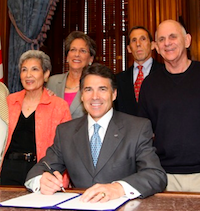Texas lawmakers today moved to make the state’s Holocaust and Genocide Commission an advisory committee of the Texas Historical Commission, rather than a self-standing entity. They decided against abolishing the organization, as had been recommended during a state review.
The Texas Holocaust and Genocide Commission was created in 2009 as an advisory body to support public education and awareness in Texas about the Holocaust and other genocides.
The commission last year underwent a review by the Sunset Advisory Commission, a legislative branch agency overseen by a board of lawmakers. The evaluation was carried out by Sunset staff as part a regular review process that most Texas agencies undergo.
In a November 2020 report, Sunset staff wrote, “The Texas Holocaust and Genocide Commission has never functioned as intended, cannot show measurable benefit to the state, and should be abolished.” Doing so would save the state about $700,000 a year, according to the report.
The review did not assess the importance of educating Texans about the Holocaust, but only reviewed its operational performance, effectiveness, and compliance with its governing statute.
A key finding was that the commission undertook projects with an affiliated nonprofit, the Friends of the THGC, without identifying clear educational goals, detailed budgets, and performance measures.
The report stated, “The review revealed a disorganized and unsupervised advisory body that has exceeded its statutory authority, neglected some of its original advisory duties, and increased its reliance on general revenue by nearly 1,000 percent, without clearly articulated goals.”
“While well-intentioned, the commission’s actions demonstrate how a state entity can go astray in the absence of needed oversight and accountability.”
‘Too Important to Eliminate’
The recommendation to abolish the organization ran into pushback from several lawmakers. Senator José Menéndez (D-San Antonio) issued a statement saying he was “disheartened” by the recommendation.
“Many of us have come together as a community and worked tirelessly to ensure that the history of our brother and sisters are both preserved and told factually, so that we never forget the atrocities,” he said.

Rep. Craig Goldman (R-Fort Worth), a member of the Sunset Advisory Commission, said at a December 7 meeting, “Ever since this staff report came out, my phone’s been blowing up. So I wanted to say publicly, what I’ve been telling so many people privately: As long as I am here, this commission is not going to be abolished.”
“So we’re going to work to get y’all back on track,” Goldman said.
During testimony at the same hearing, Lynne Aronoff, the volunteer chair of the Holocaust Commission, said, “We take seriously what the Sunset Commission staff has said about us and we are confident that at the end of the Sunset review process, the governor and the legislature will reaffirm their commitment to Holocaust and genocide education throughout the state of Texas.”
“The (Holocaust) Commission acknowledges its imperfections… We believe that we will emerge from this very important process stronger and improved as a result.”
Dr. Edward Westermann, a member of the Holocaust Commission and a history professor at Texas A&M University San Antonio, said, “I was honored to wear a military uniform for over two decades. But I am equally honored to represent my native state on this important commission at a time when racial strife, anti-semitism, and ethnic conflict are on the rise throughout the world.”
He called on the Legislature not to abolish the commission.
Likewise, Joy Nathan, who served as Executive Director of the Holocaust commission since December 2019, testified that the THGC was “too important to eliminate.” She said, “The THGC should not be abolished, especially during this time of polarizing public discourse.”
Placed Under Historical Commission
The Sunset Commission made its final decision about the Holocaust Commission at a meeting today in the John Reagan building of the Texas Capitol complex.
Rep. Goldman moved to continue the commission as an advisory body of the Texas Historical Commission (THC), which would have ultimate authority over THGC’s budget, expenditures, contracts, and matching grant awards.
Goldman’s proposal stated, “THC would also have authority to delegate certain final authorities to THGC that are appropriate for an advisory body, such as approval of educational materials for the annual Holocaust Remembrance Week.”
Under the new arrangement, the Genocide Commission’s six staff would become employees of the Historical Commission, effective September 1, 2021. The 15 all-volunteer commissioners would be appointed in the same way as they are presently.
Goldman’s motion was adopted without objection. On the basis of that decision, legislation will be written to modify the commission’s existing governing statute. Known as a “Sunset bill,” the proposal will need to go through the normal committee hearing process and floor votes this spring, and could still be amended.
However, a substantial change from today’s Sunset recommendation looks unlikely. Sunset bills often are approved without amendment, or with minimal changes, particularly when there has been no division among the lawmakers who sit on the Sunset Commission.
Once renewed in statute, the Texas Holocaust and Genocide Commission will continue under new authority at least through 2031, when the Historical Commission itself is scheduled for Sunset review.
© Honest Austin. Subscribe for as little as $1.99/month to help us continue this vital work.
